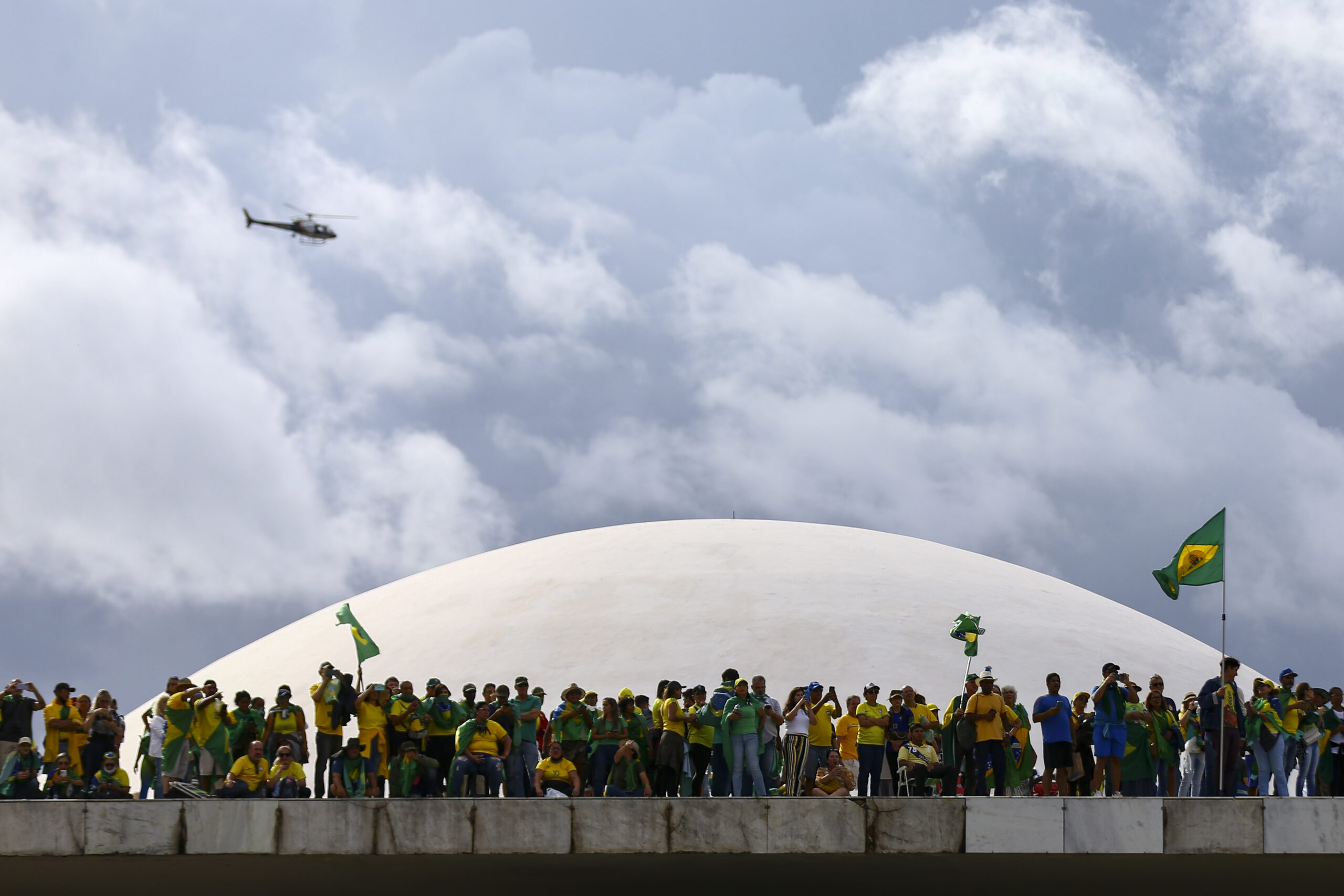
This article is part of RioOnWatch’s #VoicesFromSocialMedia series, which compiles perspectives posted on social media by favela residents and activists about events and societal themes that arise.
Criminal attacks against the federal government in Brasília cause outrage on social media threads of favela community organizers in Rio de Janeiro, for making clear that the Brazilian police tradition of shooting first and asking questions later is reserved solely for the favelas and peripheries.
“The Military Police’s apparent oversight does not conform with its actions during peaceful demonstrations. Check out 20 times when the police attacked and arrested protesters for nothing,” said the Association of Digital Journalism (AJOR) in a post published on Twitter:
A aparente omissão da PM, no entanto, não condiz com sua ação em manifestações pacíficas. Confira 20 vezes em que a polícia atacou e prendeu manifestantes por nada. (via @pontejornalismo). https://t.co/XXfiT1Hk9u
— Ajor (@ajor_digital) January 9, 2023
Published a few hours after a series of seditious attacks in Brasília last Sunday, January 8, the post draws attention to the “meekness” of the State security forces’ treatment of the actions of far-right Brazilian supporters of former president Jair Bolsonaro (PL)—most of them white. In contrast, favela residents are typically treated quite differently when they claim any rights.
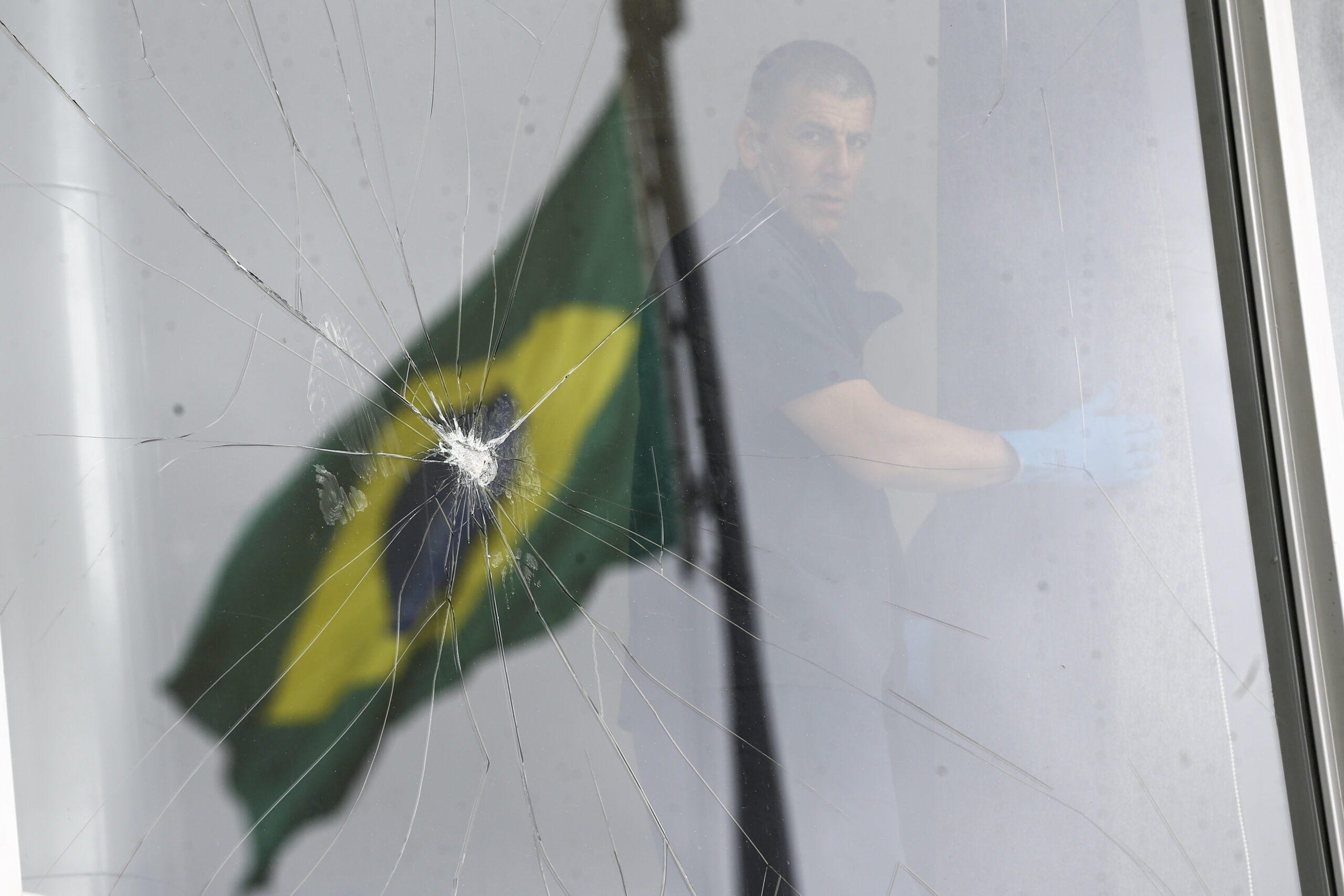
“This is inconceivable. I’m born and raised in a favela and the things I’ve seen the Military Police (PM) do during a police operation are painful and traumatic. However, what we are seeing in Brasília is an invitation to tea and a cuddle,” protested Laerte Bruno, a resident of the favelas of Complexo da Maré and creator of UniFavela. In another Twitter post, he added:
A PM confundiu um pedaço de madeira com uma arma matando com um tiro de fuzil o catador de materiais recicláveis Dierson Gomes da Silva.
Em Brasília, a PM flerta com o bolsonarismo, conversa e tira até foto durante o atentado e vandalismo. pic.twitter.com/Qca1doSiS1
— laerte (@brenolaerte) January 8, 2023
The PM confused a piece of wood for a gun and killed waste picker Dierson Gomes da Silva with a rifle shot. In Brasília, the PM flirts with Bolsonarism, chats, and even takes photos during the attack and vandalism.
The survey mentioned above by AJOR was carried out by Ponte Jornalismo and published on December 13 of last year. That was the day when radicalized supporters of the former president, outraged by President Lula (PT) being certified by the Superior Electoral Court (TSE)—closing the window for any possible challenges on his election—set fire to cars and buses, tried to throw a burning bus off an overpass, raided commercial establishments, terrorized children, and spread gas cylinders through the streets.
All of this was duly recorded and broadcast by the Bolsonarists themselves, who call themselves “patriots” on social media. This is exactly what happened again in the criminal acts of January 8, classified as domestic terrorism by part of the Brazilian media.
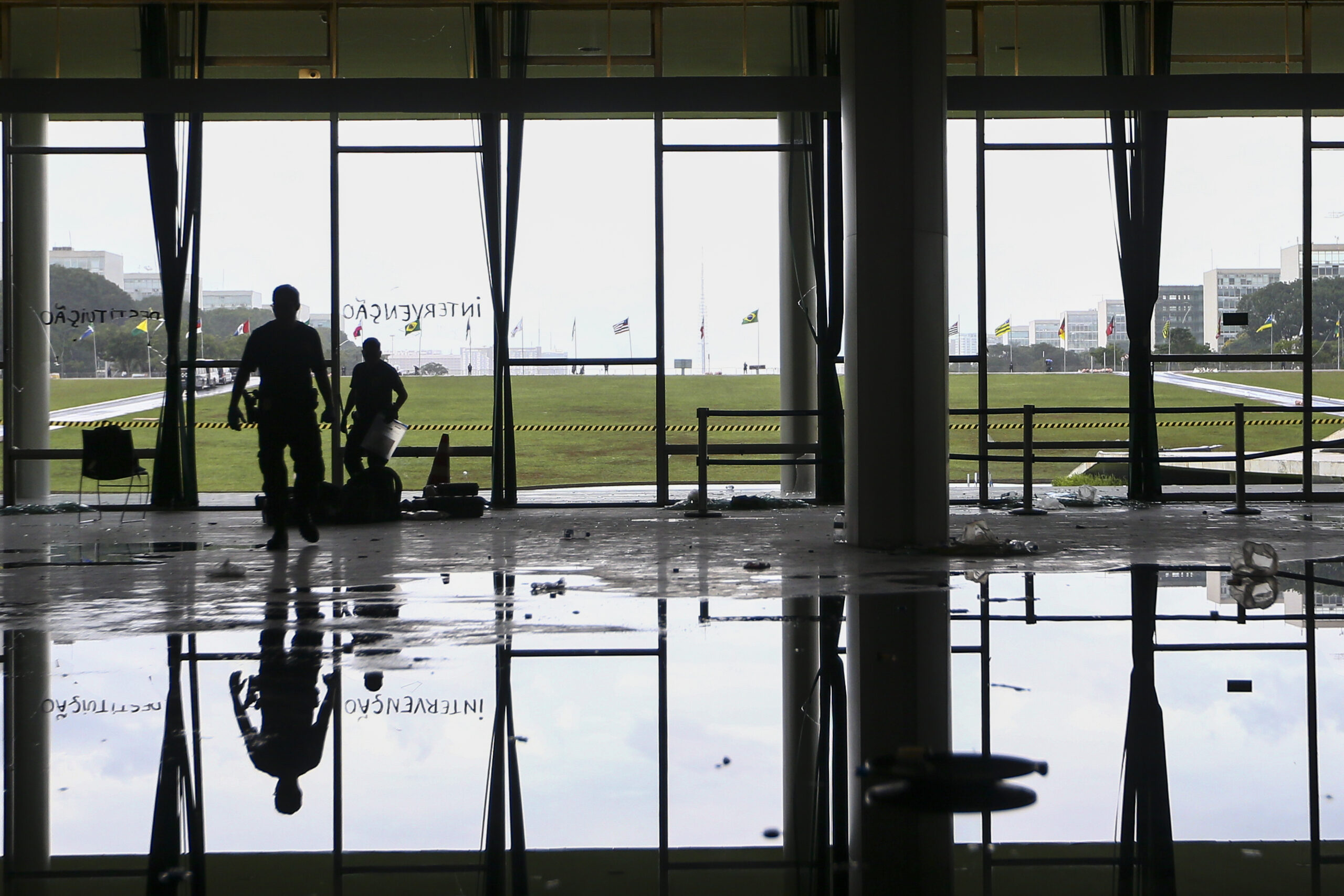
They do not accept the result of the 2022 election and the beginning of the Lula’s administration. The president-elect took office on January 1 in a ceremony broadcast by TV channels and attended by 73 foreign delegations and 11 heads of State, as well as representatives from the three branches of government: Executive, Legislative and Judiciary.
The “extremists” and “radicals” insist on contesting the result of the electoral process already endorsed by the Superior Electoral Court (TSE), without any proof, even though Lula won the elections with 50.90% of the votes—2,139,645 votes ahead of former president Jair Bolsonaro (who received 49.10% of the vote). In a tweet, Complexo do Alemão activist Rene Silva says:
Perdemos a eleição passada, mas não fizemos isso. Protestamos? sim! Fomos contra Bolsonaro? sim! Mas aceitamos democraticamente porque acreditamos no sistema eleitoral do nosso país. É preciso saber ganhar e perder, gente.
— Rene Silva 🇧🇷 (@eurenesilva) January 8, 2023
We lost the last election, but we didn’t do this. Did we protest? Yes! Did we go against Bolsonaro? Yes! But we accepted it democratically because we believe in our country’s electoral system. You’ve got to learn to win and lose, people.
In broad daylight, waving Brazilian flags, flashing smartphones and wearing Brazilian national football team jerseys, on Sunday afternoon thousands of protesters stormed and plundered the Planalto Presidential Palace, the Federal Supreme Court (STF) and the National Congress: Brazilian democracy’s most iconic buildings.
“They set fire to buses, try to blow up the airport, invade and tear up the Planalto Palace, Congress and the STF, but it’s in the favela that they confuse an umbrella for a rifle,” criticized Preta Ferreira, singer and artivist of the struggle for housing in the Homeless Movement of Downtown São Paulo (MSTC). She has been criminalized by the São Paulo Police and spent 109 days in prison.
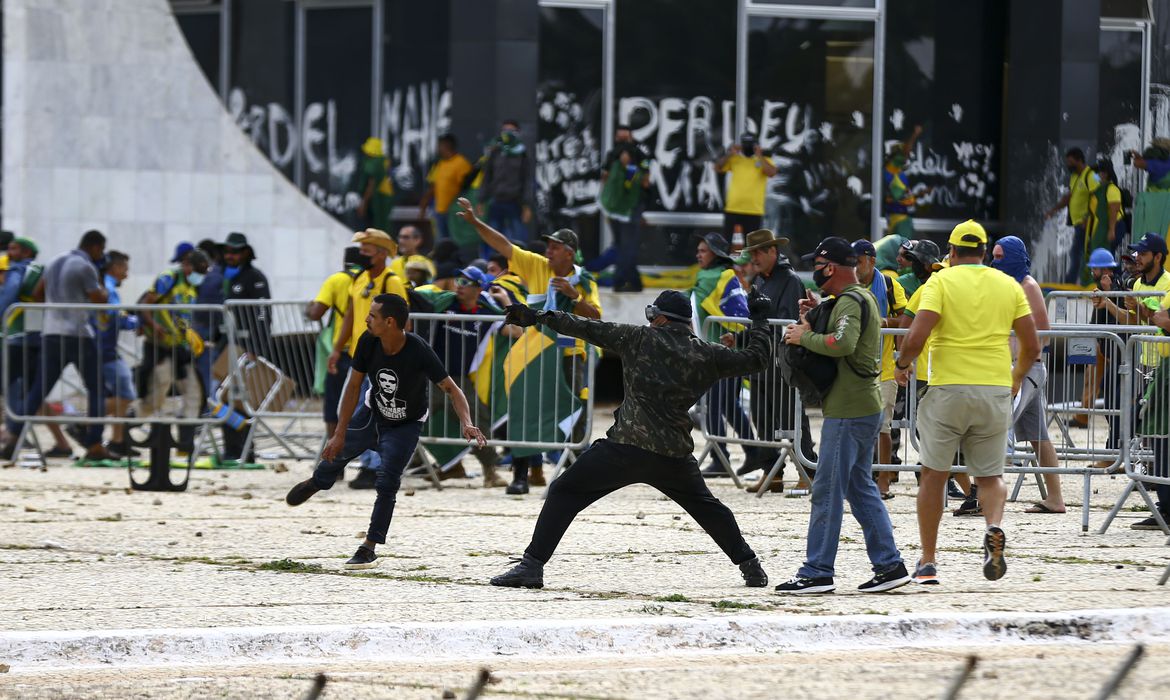
The attack on the Brazilian Republic was compared to that in the United States two years prior by Minister of Justice Flávio Dino—and by international media, such as The Guardian—as the “Brazilian Capitol [Riots].” “Yesterday, we experienced the Brazilian Capitol [Riots], but with two differences. The first is that there were no casualties and the second is that there are more arrests here than there,” said Dino, referring to the invasion of the U.S. Capitol on January 6, 2021.
Following the attacks, as reported by the newspaper Nexo, President Lula decreed federal intervention in Brasília—whereby the nation’s Federal District‘s public security would be federally controlled due to the negligence of local police on Sunday the 8th. In the early hours of January 9, Judge Alexandre de Moraes, of the Supreme Court, ordered the removal of the Federal District governor, Ibaneis Rocha (MDB), from office for 90 days. In his decision, Moraes said there had been “omission and collusion of several security and intelligence officials,” referring to the rapid escalation of violence in the anti-democratic acts.
Quantas crianças teriam levado bala desses mesmos policiais se essa cena fosse em uma favela? pic.twitter.com/kSWYmiqht1
— Ale Santos (@Savagefiction) January 8, 2023
How many children would have been shot by these same police officers had this taken place in a favela?
Both decisions were in reponse to a possible “meekness” shown in the lack of response by the Federal District’s police and governor to the arrival of dozens of buses full of people participating in the coup attempt. As was widely shared on social media, they didn’t just organize anti-democratic acts but also incited the invasion of the three seats of power in Brasília.
O privilégio branco te permite invadir prédios públicos, espancar jornalistas, policiais, e sair ileso. Inacreditável o que aconteceu na Praça dos Três Poderes.
— Pedro Borges (@pedroborgesf) January 8, 2023
White privilege allows you to invade public buildings, beat up journalists, police, and leave unscathed. Unbelievable what’s happened at the Three Powers Plaza.
The supposed “demonstrators” were escorted by Military Police along the Ministries Esplanade without any resistance from security forces. A small contingent of agents tried to stop the group with pepper spray but the barrier was easily broken through and the Three Powers Plaza taken over.
Nenhuma pessoa baleada? Nenhuma bala perdida? Brasília não é favela.
— Lana de Holanda 🇧🇷🏳️⚧️ (@lanadeholanda) January 8, 2023
No one has been shot? Not a single stray bullet? Brasília is not the favela.
Videos that circulated online document police officers calmly filming the invasion, posing for photos with the invaders inside the Senate building, showing them where to go, and even calmly chatting with them.
Ver essa foto no Instagram
We’re facing an attempted coup! The extreme-right in Brazil wants to impose their authoritarianism over our Constitution. It’s time for the broadest unity to make them go back to the gutter. Calling for them all to be identified and held accountable.
This police behavior is in contrast with the excessive use of force by police in demonstrations demanding the rights of teachers, students, and social movements, and above all the protests by residents of favelas and the urban periphery of Rio de Janeiro, and daily police operations.
Ver essa foto no Instagram
What’s the justification for the differential treatment?
“For the favela: Armed Forces, Army, Military Police, Civil Police, CORE, BOPE, and even the Federal Highway Police. For the terrorists: A handshake, a selfie, and all the space they want to destroy the public and historic heritage of the Brazilian people, which THEY’RE NOT PART OF,” protested Kananda Ferreira, resident and photographer from Maré.
Raull Santiago from the Straight Talk Collective in Complexo do Alemão, also used social media to emphasize how the anti-democratic actions in Brasília make explicit the institutional racism of the police:
Eis a explícita estrutura de um país racista, onde a frágil democracia nunca foi garantida em igualdade para todas as pessoas.
Um protesto na FAVELA, muitas vezes é reprimindo com extrema violência já no início. Enquanto isso, invadem a maior estrutura do país com essa “leveza”.— Santiago, Raull. CPX 💛💚🇧🇷 (@raullsantiago) January 8, 2023
Here’s the explicit structure of a racist country, where the fragile demoncracy has never been guaranteed equally for everyone. A protest in the FAVELA is often repressed with extreme violence from the start. Meanwhile, they invade the largest structure in the country with this “levity”.
Jonas Di Andrade, from the internationally-renowned community newspaper Voz das Comunidades, reminded that it’s not just the favela which is repressed with excessive force, but also teachers’ protests.
Quando professores vão às ruas, quando estudantes vão às ruas, quando trabalhadores, mães de favela, que tiveram seus filhos mortos pela PM, vão às ruas, o tratamento é de extrema violência. Já com os vândalos bolsonaristas quebrando tudo no Congresso Nacional não acontece nada.
— Jonas Di Andrade (@jonasdiandrade) January 8, 2023
When teachers take to the streets, when students take to the streets, when workers, favela mothers whose children have been killed by the Military Police, when they take to the streets they’re treated with extreme violence. But when Bolsonarist vandals break everything in the National Congress, nothing happens at all.
On Monday, January 9, the heads of the Executive, Legislative, and Judicial branches published a joint statement defending democracy. In the document, the leaders repudiate and classify the actions that took over Brasília as “acts of terrorism and vandalism, with criminal intent, and attempted coup.”
Responses to the Attacks
In a historic scene, President Luiz Inácio Lula da Silva walked alongside Judge Rosa Weber from the Federal Supreme Court and 27 state governors from the Three Powers Plaza to the plundered court building. “They want a coup, but there won’t be a coup. They need to learn that democracy is the most difficult thing for us to do because it requires us to tolerate others, it requires living with those we don’t like,” affirmed Lula in a meeting with the heads of government branches and state governors.
Ver essa foto no Instagram
First week of government in two images.
Fulfilling orders from the STF minister, a joint operation by Federal Police and the Army dismantled the Bolsonaro supporters’ camp that had been set up in front of the Army headquarters in the Federal District for over two months. Similar actions were carried out in at least 23 Brazilian states, including Rio de Janeiro.
Minister of Justice and Public Security Flávio Dino informed that over 1,500 people had been arrested or detained for crimes carried out on January 8. They were taken to the Federal Police Academy, had their fingerprints taken, and will be charged with crimes such as terrorism and attacks against democracy.
Meanwhile, people took to the streets in demonstrations defending democracy in various Brazilian state capitals. The largest took place in São Paulo which occupied six blocks on Avenida Paulista.
Cinelândia lotada no Rio de Janeiro! Reação imediata ao golpismo fascista, chega! SEM ANISTIA! pic.twitter.com/iwxHfGRr90
— Matheus Gomes (@matheuspggomes) January 9, 2023
Cinelândia in Rio de Janeiro packed! Immediate reaction to the fascist coup, enough! NO AMNESTY!
In Rio de Janeiro, even with the rainy weather, the Cinelândia square in front of the City Council building was occupied by hundreds of protesters. Many wore the CPX cap with the acronym used for “Favela Complex” in Rio, in particular Complexo do Alemão.
O CPX esteve presente no ato de ontem em defesa da democracia. Favelas na luta! ✊🏾 pic.twitter.com/FD6JkHhXXr
— Jonas Di Andrade (@jonasdiandrade) January 10, 2023
CPX is present at yesterday’s demonstration in defense of democracy. Favelas in the fight!
“No Amnesty:” What Does This Mean?
The phrase “no amnesty” has become popular since it was chanted by the crowd at President Lula’s inauguration ceremony. Amnesty is an official pardon which erases someone’s conviction and its consequences. It’s granted by National Congress via a federal law.
With the loss of legal protections on leaving the presidency, former president Jair Bolsonaro—who has no parliamentary mandate for the first time in 31 years—could face a series of court cases.
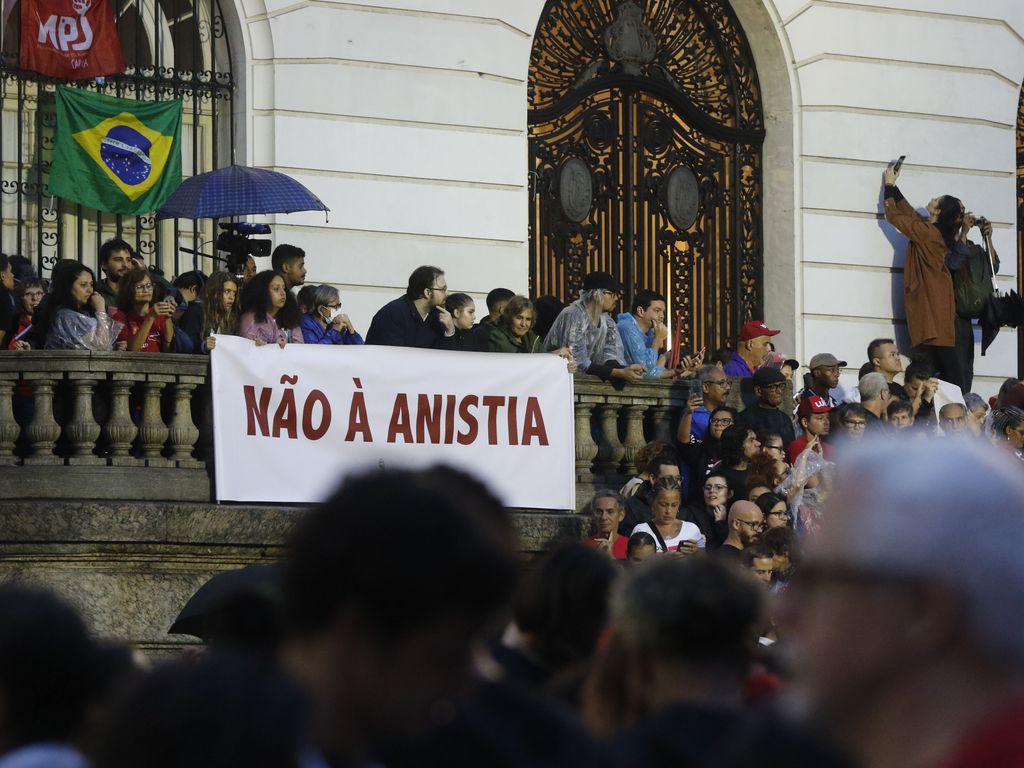
About the author: Tatiana Lima is a journalist and popular communicator at heart. A black feminist, member of Complexo do Alemão’s Researchers in Movement Study Group, she is currently special reporter with RioOnWatch. A fair-skinned black woman, born and raised in a favela, Lima currently lives in Rio’s periphery and is a doctoral student at the Fluminense Federal University (UFF).
